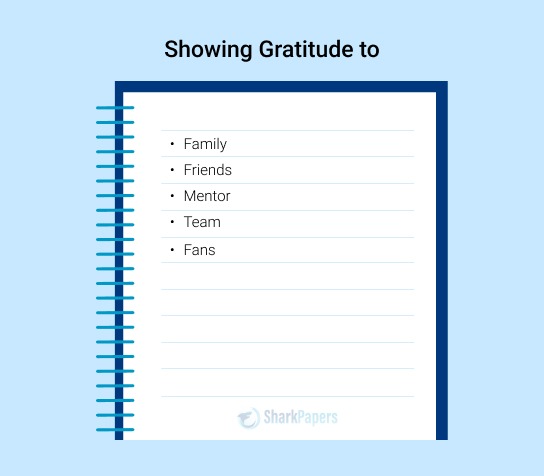What is a Graduation Speech?
A graduation speech, often called a commencement speech, is a special address given during a graduation ceremony. It’s a chance for the speaker, usually a student, faculty member, or guest, to share thoughts, reflections, and advice with the graduating class.
This speech typically includes expressions of gratitude to those who supported the graduates, highlights of memorable moments, and reflections on the journey ahead.
The goal of a graduation speech is to:
- Celebrate the achievements of the graduates
- Offer inspiration as they move forward into the next phase of their lives.
- Look back on the shared experiences
- Acknowledge the hard work
- Encourage optimism for the future.
A well-crafted graduation speech combines personal anecdotes, meaningful insights, and a touch of humor to leave a lasting impression on the audience.
How to Write a Good Graduation Speech
Let’s break down the speech-writing process into simple steps that can make the process much easier. Follow the commencement speech guidelines listed below to write a powerful speech.
Step 1. Choose a Topic
Start by selecting a speech topic that resonates with you and your audience. Think about themes like personal growth, overcoming challenges, or celebrating milestones.
For example, you might choose a topic like “Embracing Change” if you want to talk about how everyone has grown during their time in school.
Step 2. Brainstorm Ideas
Once you have a topic, brainstorm ideas and jot down any thoughts or stories that come to mind. Consider memorable moments from your time in school, experiences that shaped you, and the lessons you’ve learned.
For instance, think about a funny incident that happened in class, a meaningful project, or a piece of advice that stuck with you. Write these down as potential content for your speech.
Step 3. Make an Outline
Create an outline to organize your thoughts and structure your speech. A typical graduation speech outline might include:
- Introduction: Start with a greeting and introduce your topic.
- Body: Discuss key points, such as memorable experiences, accomplishments, and reflections.
- Conclusion: Summarize your message, offer thanks, and provide a hopeful or inspiring closing thought.
For example:
|
Step 4. Write the Draft
With your outline ready, it’s time to dive into writing the first draft of your graduation speech. This step is all about transforming your ideas into a coherent and engaging speech.
- Graduation speech Introduction
So, how to start a commencement speech? Start with an attention-grabbing opening. This could be a memorable quote, a humorous anecdote, or a surprising fact that relates to your main theme. The introduction sets the tone for your speech and hooks the audience. Make sure your introduction:
- Starts with a Hook
- Introduces Your Theme
- Establishes Connection
- Graduation speech Body
The body of your speech is where you delve into the core of your message. This is where you share your main points, personal anecdotes, and reflections. Structure the body into clear sections that flow logically from one to the next. In the body of your speech:
- Organize Your Points
- Use Personal Anecdotes
- Be Conversational
- Conclusion
The conclusion wraps up your speech and leaves a lasting impression. Summarize your main points, express gratitude, and end with a hopeful or inspiring note.
- Summarize Key Points
- Express Gratitude
- End with Inspiration
Step 5. Edit and Revise
After drafting your speech, take some time to review and revise it. Look for ways to improve clarity, flow, and impact. Check for any awkward phrasing or typos. It can also be helpful to read your speech out loud or practice it in front of a friend.
Example: If you find a sentence like, “I want to acknowledge our collective success,” sounds a bit formal, try revising it to, “I’m so proud of what we’ve achieved together.”
Graduation Speech Examples
In this section, we will look at some samples of the best graduation speeches. You can read these commencement speech examples and download them in PDF format for free!
Tips to Deliver a Graduation Speech
Giving a great graduation speech isn’t just about having good content; it’s also about how you deliver it. Here’s how to make sure your speech hits the mark:
- Practice, Practice, Practice
Rehearse your speech several times until you’re comfortable with it. Try practicing in front of a mirror or recording yourself to see how you come across.
- Use Your Body Language
Stand tall, use natural gestures, and make eye contact with different people in the audience. It helps you connect with them and keeps them engaged.
- Watch Your Pace and Volume
Speak clearly and at a steady pace. Pause after important points to let them sink in and adjust your volume so everyone can hear you comfortably.
- Manage Your Nerves
It’s okay to feel nervous! Try deep breathing or visualize a successful speech to calm your nerves before you start.
- Connect with Your Audience
Engage with your listeners by addressing them directly. Show appreciation for their support and make them feel included in your message.
- Be Yourself
Speak naturally and be genuine. If you make a slip, don’t worry—just keep going. Audiences appreciate authenticity and how you handle little hiccups.
- Stick to the Time Limit
Make sure your speech fits the time you’ve been given. Practice with a timer to avoid running over or speeding through your points.
- End on a High Note
Finish with a memorable statement or call to action that reinforces your main message. A strong ending will leave a lasting impression.
Graduation Speech Ideas
Here are some creative ideas and themes for your graduation speech:
- Tell how you dealt with the change
Think of how you progressed from freshman to senior year. How did you deal with problems, disappointments, or setbacks? - Show how positivity transformed you
Talk about how positive thinking has transformed your life. Also, mention what things in your childhood sowed the seeds of optimism in you. - Talk about major failures you've encountered
Share some of your major failures and how you overcame them. Nothing is more inspiring than learning from other’s mistakes. Listening to how someone overcame their fears and learned from their mistakes can be very motivating. - Discuss how you believed in yourself
Discuss how you were a late bloomer and how you finally came to believe in your abilities. Also, explain how much you have changed since you began to believe in yourself. - Mention what or who motivated you to dream big
You can also talk about what motivated you to dream big. It can be your teacher, a book you read, a movie you watched or a turning point in your life.
In conclusion, a great graduation speech celebrates your journey, thanks those who supported you, and inspires your audience. Choose a meaningful topic, organize your thoughts, and deliver with sincerity. Whether reflecting on personal growth or looking ahead, make your speech heartfelt and memorable.
But if you are still struggling with writing your speech, the speech writing service from SharkPapers.com is here to help. From essays and speeches to just some notes, our professional writers can deliver exactly what you need.
Place your order now with our paper writing service for college and get the support you need to shine!










 Not seeing it? Check Promotions or Spam — inboxes get protective.
Not seeing it? Check Promotions or Spam — inboxes get protective.